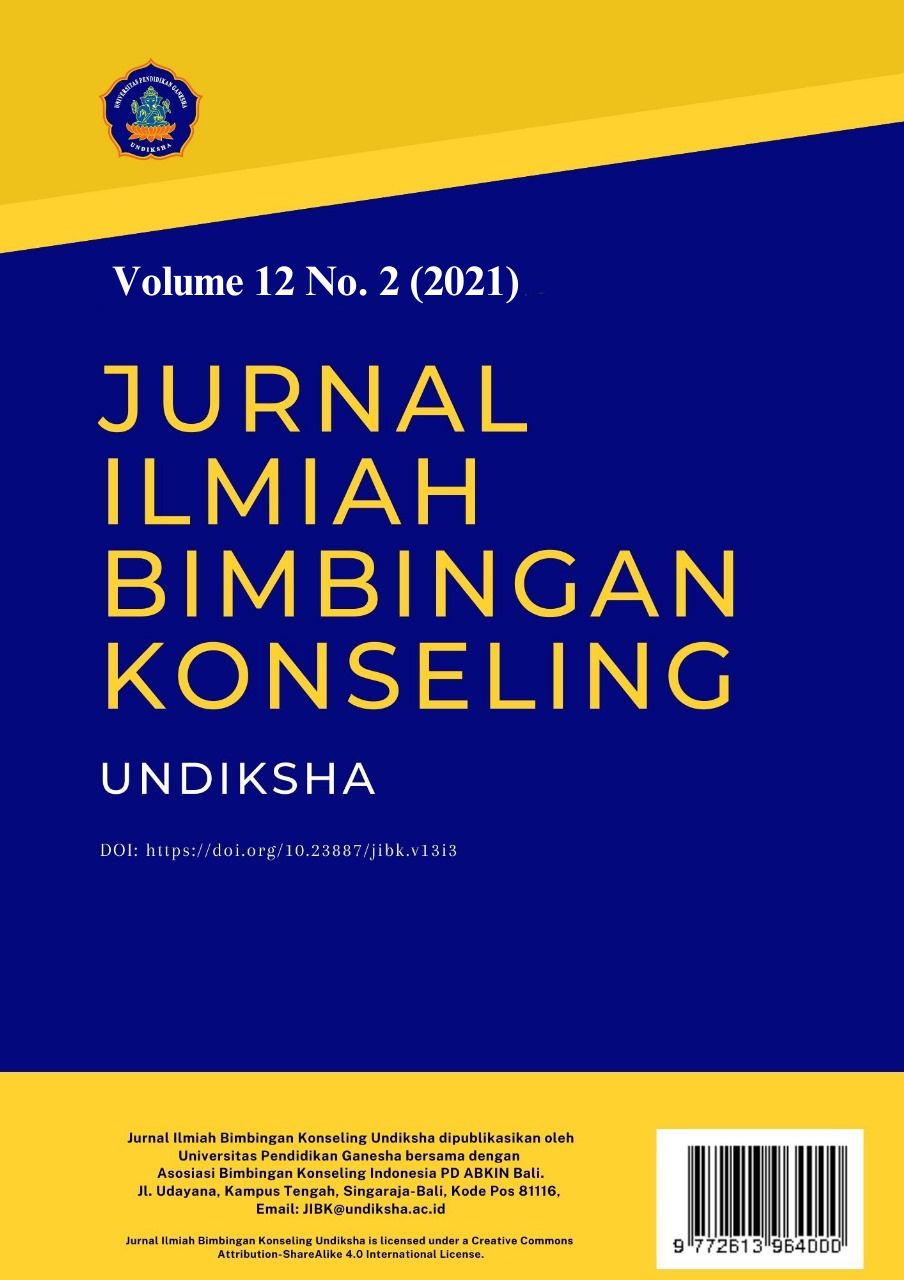Self-Efficacy With Career Adabtability For Final Students The SWCU Psychology Faculty
DOI:
https://doi.org/10.23887/jibk.v12i2.34018Keywords:
College student, Self Efficacy, Career AdabtabilityAbstract
Abstract: This study aims to determine the relationship between self-efficacy and career adaptability. Participants were 65 students from the SWCU Psychology faculty at the end of the year. Collecting data using a self-efficacy scale which consists of 10 items and a career adaptability scale consisting of 24 items, both of which have met the requirements of good reliability. Data analysis used Pearson's product moment correlation technique. The results of this study indicate a correlation coefficient of 0.470 with a significance value of 0.002 (p <0.05), which means that there is a significant positive relationship between self-efficacy and career addiction for SWCU psychology faculty final year students. Through this research, it is hoped that it can help the faculty in an effort to increase self-efficacy, one of which is by maintaining and increasing career adaptability.
References
Achnes, S., & Gusnetti, G. (2014). Faktor Faktor yang Mempengaruhi Kinerja Karyawan pada PT. Garuda Indonesia Pekanbaru (Doctoral dissertation, Riau University).
Amanah, D., & Putri, A. C. (2012). Pengaruh Lingkungan Kerja dan Komunikasi terhadap Kinerja Karyawan pada PT. United Tractors, Tbk Cabang Medan. Jurnal Niagawan, 1(2), 46-60.
Azwar, S. (2017). Metode penelitian psikologi edisi II. Yogyakarta: Pustaka Pelajar.
Bernardin, H. J. (2003). Human resource management: An experiential approach. Irwin Professional Pub.yuda
Chandrasekar, K. (2011). Workplace environment and its impact on organisational performance in public sector organisations. International journal of enterprise computing and business systems, 1(1), 1-19.
Dharmawan, Y. (2011). Pengaruh kompensasi dan lingkungan kerja non fisik terhadap disiplin dan kinerja karyawan Hotel Nikki Denpasar. Universitas: Udayana Denpasar, Bali.
Hanum, L. (2013). Motivasi dan Peningkatan Kinerja Organisasi Pendidikan. Jurnal keguruan, 93-104.
Haynes, B. P. (2005). Workplace connectivity: A study of its impact on self-assessed productivity. Doctoral dissertation, Sheffield Hallam University.
Haynes, B. P. (2008). An evaluation of the impact of the office environment on productivity. Facilities. DOI: https://doi.org/10.1108/14725960810847459
Haynes, B. P. (2008). Impact of workplace connectivity on office productivity. Journal of Corporate Real Estate. DOI: https://doi.org/10.1108/14630010810925145
Lestari, L., & Yusnita, N. (2018). Hubungan Lingkungan Kerja dengan Kinerja Pegawai Pada Sub Bagian Tanaman dan Obat Direktorat Jendral Hortikultura Kementrian Pertanian Republik Indonesia. Jurnal Online Mahasiswa (JOM) Bidang Manajemen, 3(3).
Logahan, J. M., Tjoe, T. F., & Naga, N. (2012). Analisis Pengaruh Lingkungan Kerja dan Pemberian Kompensasi Terhadap Kinerja Karyawan CV Mum Indonesia. Binus business review, 3(1), 573-586. DOI: https://doi.org/10.21512/bbr.v3i1.1344
Mahmudi. (2010). Manajemen Kinerja Sektor Publik. Yogyakarta: STIM YKPN Mangkunegara, A. P., & Prabu, A. (2005). Evaluasi kinerja sumber daya manusia. Bandung:
Refika Aditama.
Minggu, M. M., Lengkong, V. P., & Rumokoy, F. S. (2019). Pengaruh Lingkungan Kerja, Disiplin Kerja Dan Komitmen Organisasi Terhadap Kinerja Karyawan Di PT. Air Manado. Jurnal EMBA: Jurnal Riset Ekonomi, Manajemen, Bisnis dan Akuntansi, 7(2).
Praci, R. M., Yuliana, Y., & Suyuthie, H. (2017). Pengaruh Lingkungan Kerja Terhadap Kinerja Karyawan di Hotel Daima Padang. E-Journal Home Economic and Tourism, 15(2).
Pratama, A. N. (2016). Pengaruh Lingkungan Kerja Dan Disiplin Kerja Terhadap Kinerja Karyawan PT. Razer Brothers. Yogyakarta. Skripsi, Universitas Negeri Yogyakarta.
Prilian, N. M. R., Indrawati, Y., & Mananda, I. G. S. (2014). Pengaruh Lingkungan Kerja terhadap Kinerja Karyawan di PT Mitra Global Holiday Jimbaran Bali. Jurnal IPTA ISSN, 2338, 8633. DOI: https://doi.org/10.24843/IPTA.2014.v02.i01.p06
Rahmawanti, N. P. (2014). Pengaruh lingkungan kerja terhadap kinerja karyawan (Studi pada karyawan kantor pelayanan pajak Pratama Malang Utara). Jurnal Administrasi Bisnis, 8(2).
Sugiyono. (2013). Metode Penelitian Pendidikan Pendekatan Kuantitatif, dan R&D. Bandung: Alfabeta.
Sukoco, B. M. (2007). Manajemen administrasi perkantoran modern. Jakarta: Erlangga, 5.
Wijaya, H., & Susanty, E. (2017). Pengaruh lingkungan kerja terhadap kinerja pegawai pada instansi pemerintah daerah kabupaten musi banyuasin (studi kasus dinas pertambangan dan energi kabupaten musi banyuasin). Jurnal Ecoment Global, 2(1), 40-50. DOI: https://doi.org/10.35908/jeg.v2i1.213
Wirawan. (2009). Evaluasi Kinerja Sumber Daya Manusia: Teori Aplikasi dan Penelitian.
Jakarta: Salemba Empat.
Downloads
Published
Issue
Section
License
Copyright (c) 2021 Nomina Yusha Artahayest

This work is licensed under a Creative Commons Attribution 4.0 International License.
Jurnal Ilmiah Bimbingan Konseling Undiksha is an Open Access Journal. The authors who publish the manuscript in this journal agree to the following terms:
JIBK is licensed under a Creative Commons Attribution 4.0 International License. This permits anyone to copy, redistribute, remix, transmit and adapt the work provided the original work and source is appropriately cited.
This means:
Jurnal Ilmiah Bimbingan Konseling is licensed under a Creative Commons Attribution 4.0 International License.
(1) Under the CC-BY license, authors retain ownership of the copyright for their article, but authors grant others permission to use the content of publications in JIBK in whole or in part provided that the original work is properly cited. Users (redistributors) of JIBK are required to cite the original source, including the author's names, JIBK as the initial source of publication, year of publication, volume number, issue, and Digital Object Identifier (DOI); (2) The authors are the copyright owner of the article, and the author grants the JIBK held the first publication right.









.png)

.jpg)
